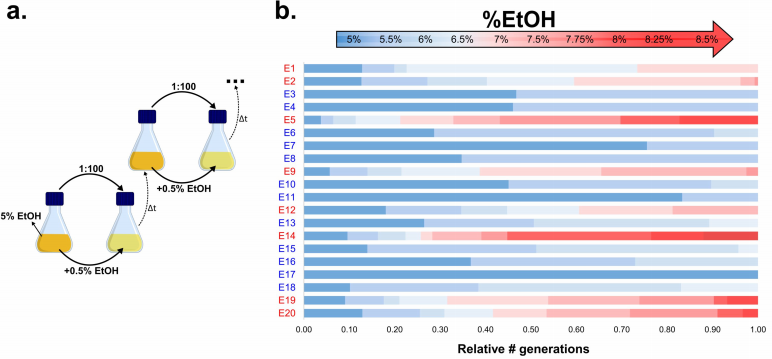Newsletter Signup - Under Article / In Page
"*" indicates required fields
Instead of taking a spa vacation, stressed out bacteria start mutating their DNA fast. This nearly suicidal behavior can yield a lucky survivor in nature. For us, it could mean new strategies for biofuel production and fighting antibiotic resistance, researchers say.
Researchers from the Centre of Microbial and Plant Genetics at KU Leuven, in Belgium, are shining new light on the phenomena of hypermutation. In a work published in eLife, they studied how biotechnology’s favorite workhorse, E. coli, changed its genome when facing high concentrations of ethanol.
High rates of mutation are risky and, under normal circumstances, weaken the bacteria. However, in stress conditions bacterial cultures seem to able to speed up DNA mutation, triggering hypermutation. It’s a lottery of sorts, with a high risk of the mutations spiraling out of control but a chance that an adapted bacteria will emerge and survive. And this is just what happened with E. coli.

Ethanol is very effective at wiping out microbe life, but some of the E. coli of the experiment were able to mutate and become tolerant to very high concentrations. Before that, the research team was able to observe some interesting features of hypermutation, such as that this gambling behavior is very much driven by cell mortality within the culture, instead of a specific stressor. Hypermutation also appears to be tunable. As ethanol concentrations are lowered, the mutation rate slows down.
Developing tolerant strains is quite valuable to industrial biotechnology, which often requires microbe strains to produce chemicals that are toxic to them. Ethanol is just an example of that, as a popular biofuel and simultaneously an environmental stressor. Beyond biofuels, tolerant strains can also help to treat difficult pollutants.
There is another, less pleasant side to this adaptability. Hypermutation can also be employed by bacteria to evade antibiotics, or by cancer cells to resist treatments. Therefore there’s very much a need to better understand the biological basis of the phenomena, as doing so could help the development of novel anti-cancer therapies and help contain the spread of antimicrobial resistance.
Images by JoeyCheung/Shutterstock and Swings et al. (2017) Adaptive tuning of mutation rates allows fast response to lethal stress in Escherichia coli. eLife (doi: 10.7554/eLife.22939)
Partnering 2030: FME Industries Report







